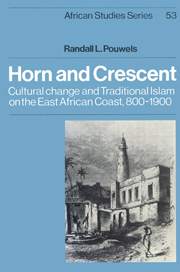Book contents
- Frontmatter
- Contents
- List of illustrations and maps
- Preface
- List of abbreviations
- Introduction
- 1 The roots of a tradition, 800–1500
- 2 The emergence of a tradition, 900–1500
- 3 A northern metamorphosis, 1500–1800
- 4 Town Islam and the umma ideal
- 5 Wealth, piety, justice, and learning
- 6 The Zanzibar Sultanate, 1812–88
- 7 New secularism and bureaucratic centralization
- 8 A new literacy
- 9 The early colonial era, 1885–1914
- 10 Currents of popularism and eddies of reform
- Notes
- Glossary
- Bibliography
- Index
5 - Wealth, piety, justice, and learning
Published online by Cambridge University Press: 23 September 2009
- Frontmatter
- Contents
- List of illustrations and maps
- Preface
- List of abbreviations
- Introduction
- 1 The roots of a tradition, 800–1500
- 2 The emergence of a tradition, 900–1500
- 3 A northern metamorphosis, 1500–1800
- 4 Town Islam and the umma ideal
- 5 Wealth, piety, justice, and learning
- 6 The Zanzibar Sultanate, 1812–88
- 7 New secularism and bureaucratic centralization
- 8 A new literacy
- 9 The early colonial era, 1885–1914
- 10 Currents of popularism and eddies of reform
- Notes
- Glossary
- Bibliography
- Index
Summary
The previous chapter was devoted to doctrinal aspects of the fusion between the African and Islamic religious traditions which took place in coastal towns. This chapter considers the economic and sociological underpinnings of leadership in the towns, with particular emphasis on the relationship between religious and political authority.
AFRICAN MATERIALISM AND THE ‘RIGHT PATH’ IDEAL
What is real in most pre-industrial societies is what works best in assuring their material well-being. Hence, in the past, African civilizations evolved as adaptations to prevailing environmental conditions, and these adaptations largely were the result of the dialogues people established with their natural surroundings. Thus, the character of a particular African civilization and the ideology which derived from it were influenced heavily by what worked best in that particular environment in bringing material comfort to human society and the resources people had on hand for its mastery. Naturally, among such resources was the collective knowledge of the world as it was handed down generation after generation and which formed a large part of a society's historical tradition and religious beliefs. Historical tradition, religious belief, and wealth were all directly linked.
An idea common among Africans, whether or not they were Muslims, was that the person who had wealth had baraka, whereas he who was impoverished was ‘wrongly guided’ and ‘had no power with God’. The world-view underlying this was one which viewed the natural and supernatural worlds as correlative and reciprocal sides of the same reality.
- Type
- Chapter
- Information
- Horn and CrescentCultural Change and Traditional Islam on the East African Coast, 800–1900, pp. 75 - 96Publisher: Cambridge University PressPrint publication year: 1987

